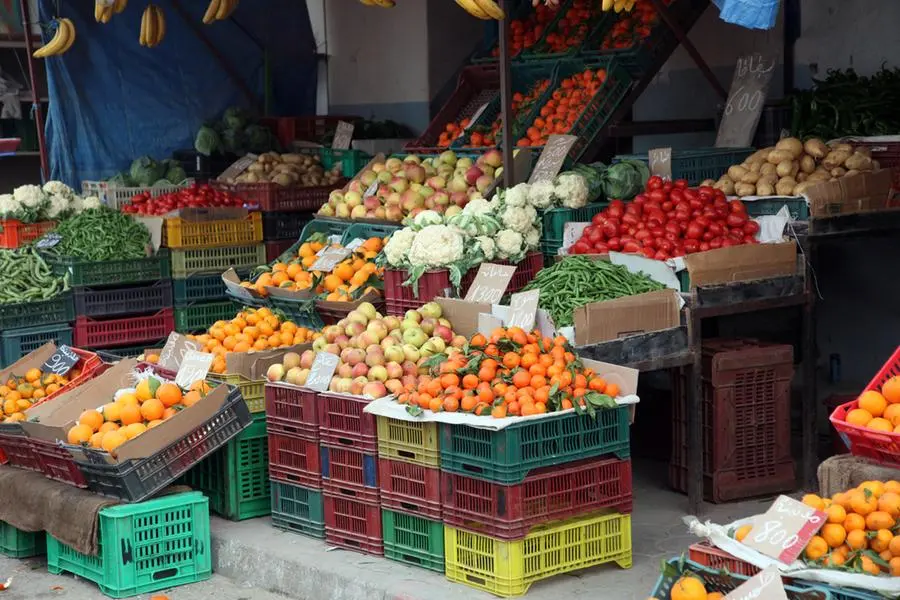PHOTO
Tunisia - The summer fruit season in Tunisia has been impacted by a significant drop in rainfall, resulting in a 24% reduction in national production. However, the surge in export prices has provided a glimmer of hope for the export market.
Tunisia's aim for this season is to export nearly 70,000 tonnes of fruit, with an increased value of exports, compared to 68,000 tonnes worth 177 million dinars during the previous season.
At a meeting of the Interprofessional Fruit Group (GIFruits) on Thursday, data revealed that the national fruit production for the 2022/2023 season is estimated to be 223,000 tonnes, a 24.3% decline from last season's production of 294.5 thousand tonnes. The ripening phase for early varieties has been delayed by nearly 20 days, resulting in reduced production rates for all fruit types, especially dry almonds, which saw a decline of 33.5% in production, estimated at 46.2 thousand tonnes. Additionally, the production of peaches and nectarines saw a decrease of 24% compared to the previous season.
The reduced fruit production can be attributed to various climatic factors that have impacted the physiology of fruit trees throughout different stages, such as the reduced cold hours for several varieties and increased temperatures during November and December. Additionally, the lack of precipitation in previous seasons and its impact on irrigation water reserves resulted in a drop in the quotas of the affected governorates and an irregularity in water supply. This situation has forced producers in the governorate of Sidi Bouzid to begin harvesting early varieties of peaches and nectarines in production areas and replace them with olive trees due to the scarcity of water resources.
Despite the challenges faced by the fruit industry, the fruit export season to Libya and the Gulf countries has commenced, with a significant increase in demand exceeding supply, leading to profitable prices for producers. Statistical indicators presented at the meeting of the Interprofessional Fruit Group (GIFruits) show promising growth in fruit exports to these regions, particularly peaches, nectarines, and apricots.
The prices for high-quality fruit varieties remain reasonable, ranging from 3 to 3.5 dinars/kg, while other fruits are marketed at prices ranging from 1.8 to 2.5 dinars/kg. Export prices are expected to rise with the start of the flat peach harvest due to high demand from Libyan consumers.
The meeting participants emphasised the importance of prioritising Tunisian fruit exports and maintaining its position in various markets, such as Libya and the Gulf countries. They highlighted the challenges of rising air transport costs, which have hindered the marketing of Tunisian fruit to several Gulf countries, despite their great potential to absorb large quantities of Tunisian products. To tackle this issue, they recommended the organisation of regular commercial flights to the Gulf countries by the national airline, Tunisair. As a result, it was agreed to schedule a meeting with the supervisory authority, the Ministry of Transport, to resolve this issue.
The meeting participants, mainly exporters, emphasised the importance of maintaining Tunisia's position in the Libyan market, which alone absorbs about 90% of the country's fruit exports. To achieve this goal, the Interprofessional Fruit Group (GIFruits) has developed a specific programme to promote Tunisian fruits at various regional and international events, in collaboration with the relevant authorities.
Currently, Tunisia is participating in the Tripoli International Exhibition (from May 7 to 13), where business meetings will be organised between Tunisian exporters and Libyan importers of agricultural products. Additionally, Tunisia will showcase its fruits at the International Exhibition "Fruit Attraction" in Spain (from October 3 to 5) and the International Exhibition of Agriculture in Jeddah (from September 17 to 20).
© Tap 2022 Provided by SyndiGate Media Inc. (Syndigate.info).




















